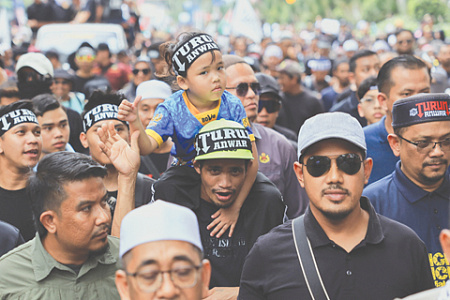
Thousands have flooded the streets of Kuala Lumpur in major opposition-led demonstrations, demanding the resignation of Prime Minister Anwar Ibrahim. Organized by the right-of-center “Perikatan Nasional” coalition under the slogan “Turun Anwar” (Down with Anwar), the protests have drawn large crowds beyond party loyalists, signaling widespread public discontent over the government’s failure to deliver on promised reforms and rein in state spending.
Anwar Ibrahim, a veteran reformist, ascended to the premiership in 2022 after his “Pakatan Harapan” (Alliance of Hope) coalition won the most seats in parliamentary elections. He campaigned on a platform of change, criticizing the previous administration for bloated expenditures and economic mismanagement during the pandemic. His appointment by the king was seen as a chance to usher in a new era of governance and prosperity.
However, after nearly three years in power, public patience is wearing thin. While the Malaysian economy has grown, with a 4.5% year-on-year GDP increase in the second quarter of 2025, the growth is concentrated in agriculture and services. Key sectors like manufacturing and construction are lagging, while the vital mining industry—a cornerstone of the nation’s exports—is in decline. Grand promises to stabilize the rising cost of living and attract foreign investment have yielded few tangible results, with diplomatic trips to Europe and Russia failing to secure new, impactful agreements.
Compounding the economic woes are fresh government policies that have sparked further anger. In June, the prime minister announced measures to increase state revenue by adjusting subsidies and expanding the list of goods subject to a value-added tax. Critics argue these reforms will disproportionately harm ordinary citizens already struggling with high prices. Furthermore, Anwar’s anti-corruption credentials have been called into question after prosecutors dropped graft charges against several government-linked individuals, fueling suspicions of political interference in the judiciary.
The Prime Minister’s opponents are also reviving his tumultuous past. A pamphlet detailing “50 Reasons Why Anwar Ibrahim Cannot Become Prime Minister,” first circulated in the 1990s, has reappeared at rallies. Anwar’s political career has been marked by imprisonments on corruption and sodomy charges, which he has consistently decried as politically motivated. Adding to the drama, his former mentor and rival, 100-year-old former premier Mahathir Mohamad, has joined the opposition’s ranks and participated in the protests.
For his part, Anwar Ibrahim blames the political establishment for obstructing his reform agenda, claiming that entrenched interests are resisting efforts to create a more efficient state apparatus. He also points to the fragility of his parliamentary majority, a complex coalition of over a dozen parties. This delicate political balancing act, he argues, forces a cautious approach, as any bold move could risk him losing the support he needs to govern, potentially leading to his ouster and new legal challenges.
